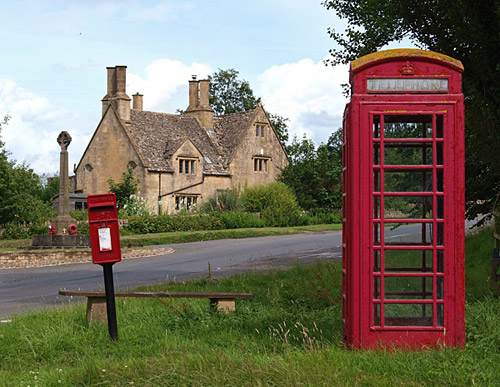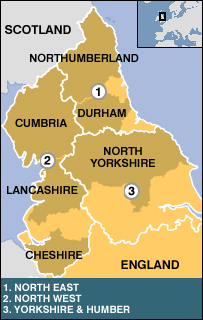My England? A study of England and Englishness

Tue, 22 Apr 2014 12:41:00 BST
The University’s ‘Englishness’ survey unveiled on St George’s Day
 MANY people in northern England feel they have closer ties to Scotland than they do to London and the south of England, meaning they would be deeply saddened if the Scots voted for independence in September. Whatever the result, the Scottish independence referendum could create the political momentum for substantial political devolution in northern England. This intriguing sub-plot to the current Scottish referendum debate is one of the findings of new research conducted by politics researchers at the University of Huddersfield.
MANY people in northern England feel they have closer ties to Scotland than they do to London and the south of England, meaning they would be deeply saddened if the Scots voted for independence in September. Whatever the result, the Scottish independence referendum could create the political momentum for substantial political devolution in northern England. This intriguing sub-plot to the current Scottish referendum debate is one of the findings of new research conducted by politics researchers at the University of Huddersfield.
They argue that events such as the independence referendum could spell the end for the “phony peace” that has defined the politics of Englishness. Although regional devolution was rejected by voters in the north-east England in 2004, there are new signs of mounting support for a northern or Yorkshire assembly and several pressure groups have begun to stridently put forward their case, according the authors of My England? A study of England and Englishness.
The report’s findings are based on a detailed survey of attitudes among hundreds of staff and students at the University. It was led by Dr Andy Mycock, who is Reader in Politics, in tandem with Research Fellow Dr Shaun McDaid and second-year politics student Jack McCabe. They devised a questionnaire that garnered 532 responses, including many detailed comments, and which suggests significant engagement of people in the north of England with debates about English culture and politics and also the Scottish independence referendum.
St George’s Day Bank Holiday?
 Debates about English national identity are an established feature of academic research at the University of Huddersfield. The latest survey was the third to have been conducted since 2009 and charts evolving attitudes during a period of significant uncertainty about the future of the United Kingdom.
Debates about English national identity are an established feature of academic research at the University of Huddersfield. The latest survey was the third to have been conducted since 2009 and charts evolving attitudes during a period of significant uncertainty about the future of the United Kingdom.
One of the aims of the new survey was to test the strength of English national identity by canvassing levels of support for St George’s Day – April 23 – becoming a Bank Holiday.
The survey found that 60% supported the idea, but the figure slumped when it was suggested that this would be granted only at the cost of losing an existing holiday, while a third of respondents said they did not want to mark April 23 with a Bank Holiday at all.
“St George’s Day offers a growing number of people an opportunity to celebrate their English identity, though they are less sure how the day should be marked,” said Dr Mycock, who unveiled the new report at a public lecture at the University on April 23.
“We argue that such uncertainty does not matter as long as people are able to mark St George’s Day in an inclusive manner that does not seek to offend others,” he added.
“However, support for a public holiday is conditional and many are reluctant to give up existing public holidays to mark their Englishness. It is also clear that St George’s Day lacks sufficient popular appeal to be considered an inclusive English national day for all.”
 Regional devolution for the North
Regional devolution for the North
The survey found that many English people appear happy to switch between an English and British identity and appeared unsure of differences between them.
Also, there are signs of growing resentment towards the political and economic dominance of London over the rest of England. A significant number of respondents expressed a strong affiliation for their northern roots, noting pride in their Yorkshire and local origins, with 20% calling for regional devolution of government.
But most respondents were content with current political arrangements and did not think that the main political parties needed to adopt a more strident English nationalism, thus appearing to confirm previous research on the ‘party politics by Englishness’ by Dr Mycock.
The survey showed that 75 per cent supported the maintenance of the union with Scotland. But the report also argues that the Scottish referendum debate has been notable for its lack of engagement with the north of England or any serious effort to address political, economic and social issues that will emanate from the vote on September 18 – regardless of the outcome.
“Proponents of independence and supporters of the maintenance of the union are both guilty of running insular and exclusory campaigns that rarely engage with the interests of citizens of the rest of the UK, particularly the large Scottish diaspora, or Scotland’s northern English neighbours,” write the report’s authors, adding that “set-piece speeches have mainly focused on the merits of Scottish independence rather than its implications for the north of England.”
No to Scottish independence
 The questionnaire showed that 72.9 per of respondents – if they had a vote in the referendum – would opposed independence. And 79.3 per cent did not believe that, in the wake of a Scottish breakaway, England should in turn seek independence from what remained of the UK.
The questionnaire showed that 72.9 per of respondents – if they had a vote in the referendum – would opposed independence. And 79.3 per cent did not believe that, in the wake of a Scottish breakaway, England should in turn seek independence from what remained of the UK.
“However the overriding sentiment of the respondents to the survey of the prospect of Scottish independence was one of sorrow,” state the researchers.
“The sense of northern English connection with Scotland was evident for many, particularly when compared to London and the south of England.”
The report describes the survey “as a fascinating snapshot of how the students and staff of the University of Huddersfield understand England and Englishness”. It is argued that “most appear unconcerned about the lack of a civic framework to express Englishness, with many respondents being more concerned about regional disparities in political, cultural and economic resources between the north of England and London and the south-east of the country.
There are concerns over how Englishness is understood, particularly in terms of its ethnic undertones. “While such concerns have some foundation, there does appear to be a growing pride in a distinctive cosmopolitan, multicultural Englishness that is rightly lauded as a progressive national asset,” write the authors of My England? A study of England and Englishness.







